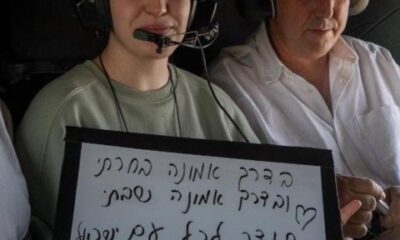
Featured Item

War trauma reverberates across Israeli society
A 33-year-old woman was recently arrested at a mall in Herzliya in Israel after attacking a security guard with an axe. Appearing barefoot, laughing, and covered in blood, she’s now suspected of murder after the body of her six-year-old son was discovered in their apartment by the child’s grandmother, along with the stabbed corpse of their family dog.
The child’s father, who had just returned from reserve duty near the Gaza border, was confronted with the heartbreaking news. While police take charge of the investigation, the woman remains in hospital under psychiatric evaluation.
This gruesome story which sent shockwaves through the community has shed light on the trauma of living through a war.
“What happened on 7 October began a trauma that is ongoing and has profoundly disrupted our society’s sense of safety,” says South African psychologist Dr Stacey Leibowitz, who specialises in complex trauma at her practice in Israel.
“Post 7 October many of my clients with general stress and anxiety disorders are experiencing exacerbated symptoms. There’s a widespread sense of pervading insecurity and future uncertainty,” Leibowitz says.
Says Amit Levy, an anger management specialist who facilitates small group workshops in Israel, “When you’re living under the stress of war, trauma triggers are experienced more easily and more frequently. Naturally, because the area of the brain activated when one is afraid and responding to threat is the same area that lashes out in anger.
“Many people are experiencing an escalation in anger,” Levy says. People who find it difficult to express their feelings are experiencing a bottleneck of emotions. One small trigger is all it takes to set off an outburst.
In order to deal with non-threatening, everyday situations more rationally and not reactively, Levy advises taking what he calls “a smart time out” where you ask yourself, “Am I under threat?” It’s a quick and easy way to ensure you don’t activate the anger response unnecessarily.
It’s important also to be mindful that over exposure to media can trigger complex emotions and generate feelings of alienation and loneliness.
Says Leibowitz, “People with generalised anxiety disorders who are over-exposed to negative news tend to start catastrophising, anticipating, or seeking the next focal point to fixate on, and this can result in paranoia.”
Young mothers are particularly affected by the stressors of the current war. Children are also showing increased symptoms of anxiety, triggered by the sound of sirens, with uncertainty about strangers and questions about whether they are safe in their own homes.
Mothers of soldiers fighting in the army are also experiencing tremendous anxiety. “Although Israel’s community support is strong, the reality is that those directly impacted by war who are seeking emotional support are surrounded by people under the very same strain, which has both positive and negative effects,” Leibowitz says.
People with predisposed conditions or a trauma history, particularly sexual-abuse trauma, will undoubtedly be more vulnerable during this time and easily triggered by recent events.
There’s also the realisation among many Israelis that Israel is in this for the long haul, so the pressure of war feels more persistent and continuous. “It’s important to keep as much stability, certainty, and safety within your own microcosm at home and within community environments,” advises Leibowitz.
When you’re in a prolonged situation like this there’s a lot of emotional unfamiliarity and many internal dilemmas and struggles on a daily basis. Leibowitz faces many such struggles among her clients, with things like, “I should be getting on with my life, but I don’t feel able to. I’m unmotivated and slow at work. I should book my holiday, but how can I enjoy myself when I know that there’s a soldier fighting on the border in 40-degree heat?”
She says the societal impact of war has a ripple effect, “The closer you are to the epicentre of the war, the more you experience its impact.”
Direct impact is felt by those who have experienced atrocities first hand – from the terror invasion to the hostages taken, to the many soldiers who continue to witness horrors in the aftermath of the ongoing war. This feeds into their immediate support circles – the parents of hostages, wives of soldiers, extended family members, and friends,” says Leibowitz. “And it doesn’t end there. It’s felt daily across society, even going beyond borders, where people worldwide are feeling deeply insecure with a Jewish homeland at war. This, coupled with the rise in global antisemitism, adds to growing fear and increased isolation.”
While Israelis love to travel, especially at this time of year, they are finding themselves much more reluctant to leave the country. “Israelis don’t feel as safe or secure as Jews in the world. In Europe particularly, many are making more researched calculations when it comes to travel, choosing rather to go to Balkan countries,” says Leibowitz.
Unfortunately, or fortunately, Jews have an intergenerational trauma legacy, which means they also have a built-in trauma-survival pack.
“As Jews, we expect to go through trauma, survive, and rebuild. We’re a people of great resilience and tenacity. By keeping the greater long-term perspective in mind, it can help to manage the distress of the current situation,” says Leibowitz.
Finding meaning also makes a difference to one’s ability to cope with the trauma of war. Whether it’s within a religious context or from a Zionistic or nationalistic perspective, it encourages optimism in dark days.
Broad-based Israeli society is still suffering disillusion over Israel being an unsafe home for the Jewish people. They have emerged from the haze of grief that overwhelmed them in the first few months following 7 October.
“Israelis are coping,” says Leibowitz, “because as humans, we’re built to survive.”











Alfreda Frantzen
August 10, 2024 at 9:06 am
Yes, this trauma is evidenced even here in South Africa (obviously not even near what Israilis are experiencing). But having to hear and watch pro-Palestinian demonstrations, and not being able to do anything, is its own trauma. Never mind “our” government that is so foolishly trying to avoid its own miserable failures by taking Israel to the world court.